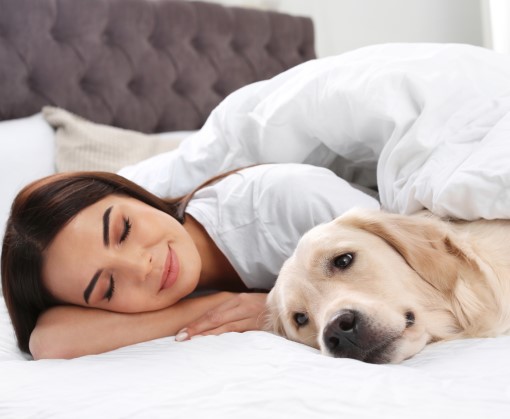
Sleeping with dog allergies: What we know and 15 remedies worth a try
By Jason Wooden, PhD | Last updated: December 14, 2024
Sleeping with a dog and struggling with allergies? You’re not the only one since 20% of people are affected by pet allergies. Allergies make it harder to sleep and can increase your risk for sleep breathing disorders. Fortunately, you have plenty of options including allergy meds, air purifiers, allergy resistant bedding, and trying a different dog breed.
Sleeping with a dog + allergies, way more at stake than you think
Given how cool and fun dogs are, it’s no surprise there are people who want to sleep with their four legged friends even with allergies.
Or maybe it’s just that a dog allergy is making it hard to get sleep, even if you keep it out of the bedroom.
Regardless, you’re not the only one.
After all, dogs are the most popular pet with around 50 million households in the US owning a pet and 33 percent of house worldwide.
That’s a lot of dog owners and you’re bound to have more than a few struggling with allergies.
In fact, more than 50 million people deal in the US alone with various types of allergies every year and it’s 6th leading cause of chronic illness!
An allergy is what happens when your immune system reacts to something that normally doesn’t bother people.
Among the things that can cause an allergy are:
- pollen
- dust
- mold
- food
- insect stings
- drugs
Unfortunately, pets can also cause allergies.
Would you believe as many 20 percent of people deal with allergies to dogs and cats?
And that as many as 30 percent of people with asthma have pet allergies?
While we love our dogs, there’s no escaping what a dog allergy can do to make us miserable.
Yes, there’s the sneezing, itch, runny, and blocked noses.
The itchy and watery eyes…
There’s also the swelling of the face and eyes, diarrhea, and vomiting.
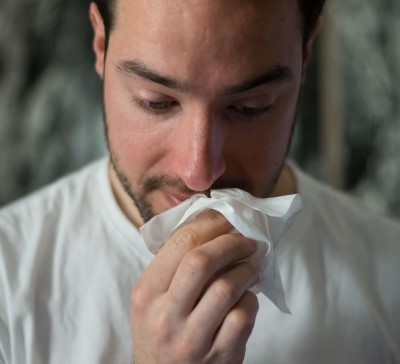
Even worse is how it can wreck our sleep.
All those symptoms can make you miserable at night too because it’s harder to fall asleep AND stay asleep. You’re more also likely to snore and more at risk for sleep disorders such as sleep apnea.
And we all need our sleep.
After a night of poor sleep, your brain doesn’t work as well as it should, you have a harder time learning, and don’t cope as well.
Over the long-term, poor sleep can increase your risk for high blood pressure, heart disease, obesity, anxiety, depression, and dementia.
That’s some pretty serious stuff and bad news for people who really enjoy having a dog in the bed.
If you’re struggling with allergies and trying to sleep with your dog, it’s not something to be taken lightly.
So, what’s a dog owner to do?
Let’s take a look at what you’re up against, the pros and cons, and some practical remedies that can make a difference.
Should you let your dog sleep in your bed?
Okay, so what are the pros and cons for people with allergies who want to sleep with their dog?
The benefits are obvious – fun, companionship, connection, and more time for new owners to bond with their dog.
Hanging out and interacting with a dog can be pretty relaxing before you go to bed.
For single people, you feel less lonely. There’s also that feeling of safety you get knowing your four legged friend will alert you to anything strange going on.

That’s all good stuff.
On the other hand, a noisy dog can disturb your sleep. Ditto, if it moves around a lot during the night.
There’s also the risk that you may accidentally injure your dog while sleeping.
And, of course, dog allergies too!
Can dog allergies get worse at night?
Yes, dog allergies, like any other allergy, can certainly get worse at night.
It’s pretty common that when people lay down you can get even more congested. Sleeping on your back encourages the flow of postnasal drip into the throat and can lead to more spells of coughing.
Another thing is that you may be exposed to more allergens in your bedroom. Besides your dog, there’s dust mites, pollen, mold, and chemicals.
And it’s pretty easy for pet dander to accumulate on carpet, curtains, bedding, and pajamas. That stuff sticks to everything.
So, if you have dog allergies, it’s no surprise if they’re worse when you try to sleep.
What can dog owners with allergies do if they still want to sleep with their dog?
So, you may be struggling with dog allergies but still want to try sleeping with your dog in the bed.
Maybe you’ve seriously thought about the downsides and have a good reason to sleep with your dog…
It could be that keeping it in your bedroom is your only option…
Or maybe it’s just that your symptoms are currently mild…
Regardless, you should know that the Asthma and Allergy Foundation of America recommends that you keep your pets out of the bedroom if you have allergies to them.
The challenge is that it’s so easy for pet allergens to accumulate and stick around in a bedroom.
That’s why the most effective way to deal with a dog allergy is to avoid having them in your living space.
However, depending on your symptoms and situation, there may be some things you can do to keep things more manageable:
1) Allergy medications
This one is pretty obvious. Your choices include antihistamines, decongestants, and nasal steroids. Depending on your symptoms, it may not be the best long-term solution.
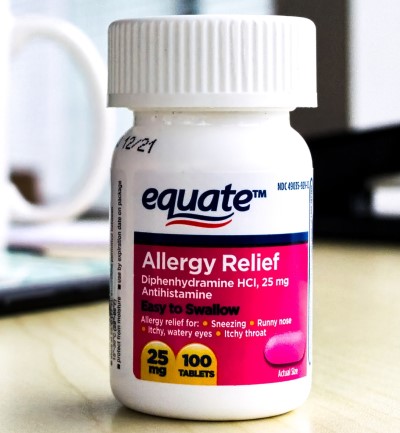
2) Allergy shots
Also known as allergy immunotherapy, a doctor can give you a specialized shots to train your immune system to react less to dog allergens.
5) Weekly dog baths
Bathing your dog more regularly can help can allergens that accumulate in the fur under control.
Ideally, you should do this at least weekly but a study testing for airborne allergies did find that washing twice a week gave better results. However, be careful so you don’t dry out your dog’s skin.
A vet can let you know what’s best for you and your dog.
More:
Finding the Right Shampoo for Your Dog (American Kennel Club)
Dog shampoos for human allergies (available on Amazon)
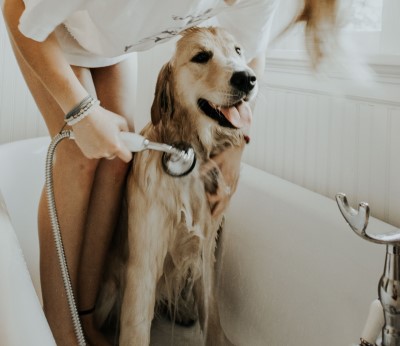
11) Use an air purifier
Another way to cut down on allergens in your sleeping space. Try running an air purifier with a HEPA filter.
Better yet, you can also add a certified allergen HVAC filter to your central heating and air conditioning system.
More:
Do Air Purifiers Work for Allergies? (GoodRx)
Air Purifiers for Pets and Allergies (available on Amazon)
15) Try a less allergenic dog breed
This one is a bit controversial as there isn’t any clear scientific evidence that some dog breeds are less allergenic than others. However, dogs with less fur and non-shedding coats might be less of a problem. Learn more
Other things that can help keep your sleep on track
It should be obvious that dog allergies may not be the only challenge for your sleep.
Unfortunately, there’s a long list of things that affect sleep.
So, why make things any harder than it already is?
That’s why it’s important to practice good sleep hygiene, the everyday habits that set the stage for restful sleep. Poor sleep hygiene can sabotage everything else you do for your sleep.
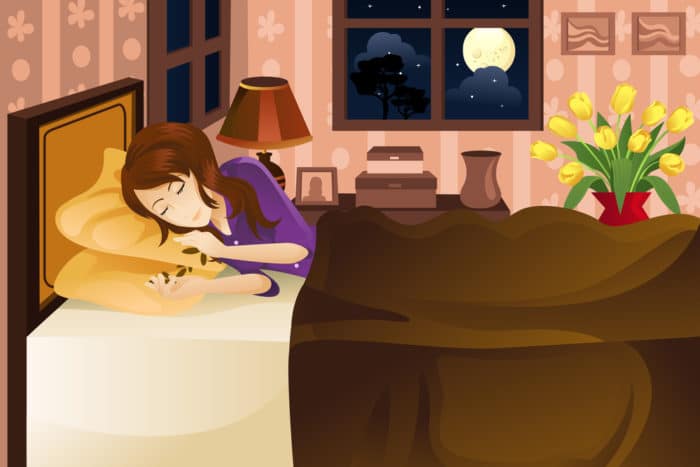
For better sleep hygiene, you should:
- keep consistent wake up & sleep times
- avoid naps
- exercise during the day
- avoid large meals, alcohol, or stimulants such as
- caffeine before bedtime
- maintain a regular bedtime routine
- avoid using TVs, laptops, or other electronics before sleep
- keep your bedroom dark, cool, quiet, & relaxing
It’s also important to see a doctor, especially if your insomnia becomes a long-term issue.
Too many people are unaware how many other medical issues can cause problems or worsen sleep. The list includes things like chronic pain, heartburn, cancer, dementia, and asthma.
You could also be living with an undiagnosed sleep disorder such as sleep apnea.
You may also be interested in:
Dogs:
A Practical guide to sleeping with a dog
9 things that can help you’re using CPAP with allergies
4 things to try if CBD is keeping your dog awake
What to do if a barking dog wakes up the baby
Other:
How to take back your sleep from allergies
9 things to try if a cat won’t let you sleep
4 things to avoid if you keep a fish tank in your bedroom
14 things to try if you’re too lonely to sleep
16 Things to try if you’re too cold to sleep
Sleep apnea: How to get sleep while dealing with a sore throat and other symptoms
7 things to try if your phone keeps waking you up
12 Things to try if a noisy neighbor is keeping you from sleeping
12 things to try if car noise is ruining your sleep
Are plants in the bedroom bad for allergies?
What to do if too much light is keeping you awake
Seasonal allergies in dogs: Signs, symptoms, and treatment (betterpet)
Sources:
1. “The Most Popular Animals Owned As Pets In The US”, Worldatlas.com
2. Pet ownership infographic, Petfoodindustry.com
3. “Allergy Facts and Figures”, Asthma and Allergy Foundation of America
4. “Allergy”, MedlinePlus website
5. Dog and Cat Allergies: Current State of Diagnostic Approaches and Challenges, Allergy Asthma Immunol Res. 2018 Mar; 10(2): 97–105.
6. “25 Noteworthy Allergy Statistics & Facts to Know in 2021”, MedAlertHelp.com
7. “Dog Allergies: Symptoms and Treatment”, 2021, American Kennel Club website
8. “Allergies and Sleep”, Sleepfoundation.org
9. “Why Do My Allergies Get Worse at Night?”, MedicineNet
10. “Pet Allergy: Are You Allergic to Dogs or Cats?”, Asthma and Allergy Foundation of America
Connect with us:
About Us
Better Sleep Simplified® was founded as a place for you to get clear and well-researched information.
Our goal is to make sure you know about your options so that you take action sooner rather than later.
Check us out on YouTube:
Watch and Learn
Helpful sleep tips, interesting sleep facts and statistics you want to know about
Affiliate Disclosure
This site is a participant in the Amazon Services LLC Associates Program and other affiliate advertising programs designed to provide a means for sites to earn advertising fees by advertising and linking to them.
Important: BetterSleepSimplified.com is for informational purposes only and is not intended or implied to be a substitute for professional medical advice, diagnosis, or treatment. Always consult a physician for sleep and health concerns. See additional information.



